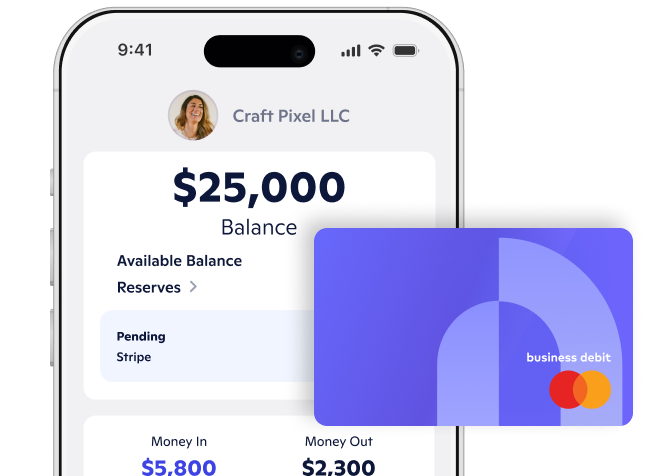
s a business owner, it's important to know what different payment options are available to you. ACH (automated clearing house) transfers and wire transfers are both methods of electronically moving funds between bank accounts. Understanding the differences between ACH versus wire transfers can help you decide which is best for your business and avoid unnecessary fees.
In this guide, we will go through what these two methods of transferring funds are, how they're different, and what to consider when making a decision about which one is best for your company.
What is an ACH transfer?
ACH transfers are electronic, bank-to-bank money transfers processed through the ACH Network batch-processing system. ACH is used by banks and other financial institutions. You can use ACH transfers for many purposes, such as direct deposits for paychecks, debts, and online bill payments.
The U.S. government also uses ACH payments to distribute Social Security checks and tax refunds. The ACH Network also underlies most other peer-to-peer transfer apps like PayPal, Venmo, and Zelle.
In an ACH transaction, the sender provides transfer information, including the recipient's banking information and the monetary amount, to their bank. The bank then sends this information to an ACH operator, such as the Federal Reserve or a private clearinghouse, who processes and sends the transaction to the recipient's bank.
ACH transfers are faster and more cost-effective than traditional paper checks, with processing times ranging from one to three business days. They are also easier to reconcile, as they provide detailed transaction information that you can easily import into your accounting software.
What is a wire transfer?
A wire transfer sends funds directly from one account to another. All you need to complete this transaction are the account and routing numbers of the recipient. You can make wire transfers through online banking platforms, in-person at a bank, through a mobile app, or by a nonbank money transfer provider.
For a wire transfer, you provide your bank with similar information as you would in an ACH transfer. Your bank will verify the information and then send a message to the recipient's bank through a secure system such as the Fedwire Funds Service. The recipient bank will then receive the information and credit the funds to the recipient.
Many people use wire transfers for international transfers because they make it easy to exchange to a foreign currency. They’re also often used for large transactions, such as real estate purchases and business payments, as limits are typically high and transfers are secure.
Differences between ACH and wire transfers
While it may seem that wire transfers and ACH transfers accomplish the same thing, there are some significant differences between the two processes that may make a difference depending on your needs.
Speed
ACH transfers are batch-processed, meaning they are grouped and sent at specific times throughout the day. Because of this, they can take one to three days to process. However, Novo offers same-day ACH transfers that allow for faster-than-average ACH payments.
Compared to ACH transactions, wire transfers are typically much faster, usually occurring within the same day or even within minutes, depending on the bank. That's because they are processed individually and sent directly between banks.
Fees
ACH transfers usually cost less than wire transfers. The exact fee will depend on the bank or financial institution. The typical cost of an ACH transfer is around one dollar per transaction. There may also be some fees associated with reversals, returns, or chargebacks. With Novo, you won't pay any fees at all for your standard ACH transactions.
Wire transfers are usually more expensive than ACH transfers since they involve a more manual and immediate process. The fees can range from $15 to $50 per transfer, depending on the bank and transaction specifics, such as the amount and whether the transfer is domestic or international. Both the sender and recipient of a wire transfer may have to pay fees.
Security
Because they use a batch-processing system and must pass through the ACH Network, which is overseen by the National Automated Clearing House Association (Nacha) in the U.S., ACH transfers are very secure. This network ensures that transfers follow strict guidelines and protocols. Also, with ACH transfers, senders can usually reverse funds in cases of fraud or payment error.
Wire transfers are also secure but are more susceptible to fraud. That's because funds are transferred directly between banks and aren't encrypted. Once the transfer is complete, it can be difficult to reverse or recover the funds if there's an issue. As a result, you should avoid wire transfers unless you communicate with and trust the intended recipient.
International capabilities
Currently, ACH transfers are primarily used for domestic transactions within the United States.
On the other hand, you can use wire transfers for both domestic and international transactions. Because these transactions are supported more globally, they are more versatile for sending funds across borders.
Accessibility
ACH transfers are widely accessible domestically, as most banks, payment apps, and financial institutions in the United States participate in the ACH Network.
Although wire transfers are also widely accessible, some smaller banks or credit unions may not offer this service, or they may have limited options for international transfers.
Limits
The transfer limits for an ACH transaction vary depending on the bank or financial institution. They can range from $2,000 to $25,000 per month.
Wire transfer limits are usually higher than those for ACH transfers, which is why they are usually best for large transactions. However, the limit will depend on the banks involved.
Which option is best for your business?
Choosing the best option for your business depends on your needs and requirements.
Factors to consider
- Speed: If you require same-day or near-instant transfers, wire transfers are usually the better option. For regular, non-urgent transactions, ACH transfers may suffice.
- Fees: ACH transfers are generally more cost-effective than wire transactions, especially for smaller transactions, although there are usually still fees you'll have to consider. However, with a Novo account, you will not be charged any fees on ACH transfers or incoming wires (both domestic and international).
- Frequency: ACH transfers are better suited for recurring transactions such as recurring bill payments and payroll processing, while wire transfers are more appropriate for one-time or infrequent transfers.
- Transaction amounts: Wire transfers tend to have higher limits in comparison to ACH transfers.
- International capabilities: Wire transfers offer more versatility in sending funds across borders.
Other payment options to consider
In addition to ACH and wire transfers, there are other payment options that may be right for you:
- Credit and debit card payments: For both businesses and customers, credit and debit card payments offer relatively fast processing times and are widely available. However, there may be fees associated with using them, so check your bank’s terms.
- Electronic Funds Transfer (EFT): EFTs include ACH transfers and other forms of electronic payment, such as online banking transfers, direct deposits, and electronic checks.
- Cryptocurrencies: Digital currencies like Bitcoin and Doge are accepted by some organizations. While they can be fast, secure, and inexpensive, they also present risks due to their volatility and regulatory uncertainties.
- Cash and checks: Cash and physical checks are gradually becoming less common than electronic and card transactions, but they are a great way of avoiding fees. However, they can be inconvenient and easily misplaced.
Ultimately, the best payment option for your business depends on your specific needs, the nature of your transactions, and the preferences of your customers or partners.
The takeaway
Both ACH and wire transfers are great ways of sending money for business owners, but there are key differences between the two. Wire transfers are faster but more expensive and slightly less secure. For regular, non-urgent transactions with lower fees, such as payroll or recurring payments, consider using ACH transfers. For time-sensitive, large, or international transactions, wire transfers may be the better option despite their higher fees.
With ever-evolving fintech options, you should stay informed about the latest developments in payment technologies and periodically reevaluate the choices to ensure your business remains efficient and competitive. Apply for a Novo account today, and get the business banking tools you need to grow your small business—including free ACH and incoming wires.
Novo Platform Inc. strives to provide accurate information but cannot guarantee that this content is correct, complete, or up-to-date. This page is for informational purposes only and is not financial or legal advice nor an endorsement of any third-party products or services. All products and services are presented without warranty. Novo Platform Inc. does not provide any financial or legal advice, and you should consult your own financial, legal, or tax advisors.
Novo is a fintech, not a bank. Banking services provided by Middlesex Federal Savings, F.A.: Member FDIC.

%201.png)
.png)




